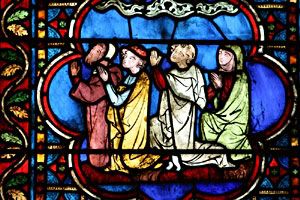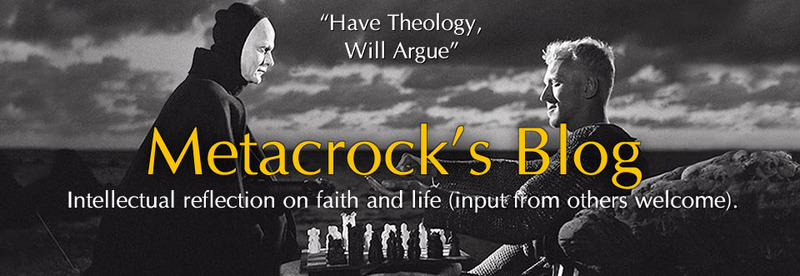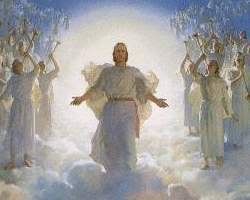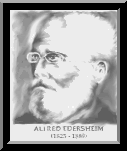
I woke up this morning thinking about this. I mean in that state where one is dropping out of a dream this idea was already running in my head, like a word document you get to exist before you go to bed. I guess it's "heavy on my heart" as they say. It was a fully hatched idea as I did my morning "business." But by the time I got the coffee brewed I had already forgotten it. The time between dawn and now, which is 6:29 has been an attempt to salvage the fragments I remember.
I have thought of all of these things before. There's really nothing new here for me, but it somehow seems more fresh and its impressed upon my mind.
I guess the place to start is with the impossibility of proving the existence of God. This is a premise I have long sense accepted, since my usual tactic is to argue for "rational warrant." I'm not sure that this is even a meaningful phrase, much less a possibility. I think the urge to produce a heuristic structure capable of evoking in the skeptic a sense of the rational nature of belief, is find and high minded. It might be possible, if one can find a skeptic who is willing to hold still, so to speak. But the whole enterprise runs up against the following problem:
Think of the nature of proving things: Proving things is a "technology." I use this term in the Faucaultian (that is, the postmodern sense) as the manipulation of objects in the world. In this sense "object" does not mean a physical thing, but an idea. We mentally bring before our minds eye objects in the world, such as “being” or “science” or “existence” or the existence of things, the universe for example. We cannot bring before our minds eye a chunk of sanctifying Grace. We cannot manipulate God as an object in creation. Belief Is, therefore, a realization about the nature of reality, not a technology. The use of this technology requires that we have physical referents. We can manipulate ideas in such a way as to understand their reference to physical objects only so long as we understand what we are talking about. We cannot understand God, therefore, we can't manipulate God or bring God before the skeptic as we might a toothbrush or swizzle stick. We make arguments for God in order to demonstrate to others something of the r realization that prompts our own belief. We are actually seeking to trigger in them the same kind of realization. To do so we manipulate aspects of reality, and the skeptic proposes alternate explanations for the various aspects we try to manipulate. Obviously this course will have no more success than trying to cram God into the parade of objects we seek to present and manipulate. But the major reason we make God arguments is because we ourselves do not understand what it is we belief. We seek to nail it down. But this is an impossible task, since God is beyond our understanding. What we should do is seek deeper, ever deeper, experiences of God. But we are rational creatures and we must spell it out for ourselves first.
The God of the Christian tradition is the the concept of the basis of reality. God is Eternal, the basis of all that is (what we used to call “firs cause”) and is always already, and thus, without cause. This means that God is the basis of reality. The basis of what is, the “ground of being” can’t be manipulated as though an object in creation. If we knew the basis upon which the realization of God is triggered in our own minds, we might be able to suggest to the skeptic ways to trigger the realization. But we don’t know. Of course we do not know. All we really know is that once we realize God is real, it works to live as though God is real. What can we tell the skeptic? I’m sure that what I’ve said so far will bring scoffing and trigger an orgiastic bought of “aren’t Christians stupid?” That’s because atheists have cut themselves off from the basic existential sense of reality that enables one to have this realization. At that rate there’s really nothing one can do. Why even write a book then?
The religious a priori is this realization, the argument I make is not an argument to prove the existence of God, but to seek the realization. That's really the strategy involved in God argument making, we seek to show that there is a basis in rationality, a method to our madness. Of course this meets with varying degrees of success. Some atheists are willing to grant even a scintilla of rationality to belief, others are merely waiting for a pay off that never comes. There is a tendency to expect an argument even after it has been stated that we can't prove them. The pay off never comes because they expect that somehow out of all the statements that God is beyond understanding we will show some back door to understanding and make it plain. The less well meaning use this absence of technology, this failure to manipulate God as one more object in the universe, as a sign that there is no God. In a sense there is no God, if by "God" we understand another object in creation. Atheists, and many Christians as well, are always putting God on the level of a big man on a throne, so that God is just one more thing in the universe. This makes God subject to the universe itself. As though the world consists of all these bits and God is just one bit alongside the others: trees, rocks, energy, tin cans, bus tokens, swizzle sticks, God, loto tickets, ect. Tillich said that God did not exist, and this is exactly what he meant by that; God does not "exist" because "existence" is something contingent things go. God is the ground of being because God is the basis upon which reality coheres.
Atheists expect this to have a high pay off. How could God be that important and not be inescapable. Of course it could be that God is inescapable but they just refuse to look through the telescope. They wont look in the way that finds God because they would mean abandoning their control. By the same token we go on making God arguments because to cease would be to lose our control. We are both sides seeking to manipulate God through a technology, as though God is a physical object to be empirically demonstrated. We we should be seeking is a means of promoting the understanding that our faith is based upon a realization about the nature of our being. What atheists need to understand is that it wont makes sense to them until they face it as a realization, not a set of data to be manipulated. This is why belief in God is a phenomenological problem. It's a matter of letting the phenomena suggest their own categories. This is after all what the believe has done to become a believer. S/he has allowed the realization of one's own being to culminate in belief. The joining of a religious tradition is merely a means of obtaining a vocabulary through which one might speak of that which is beyond words. We speak of it because in the tradition we encounter others who have encountered the realization, and thus talk about things beyond talk is meaningful, to a point. It is only meaningful to a point, because we can say "O that sounds like what I've experienced." But to speak of it is still to load it into cultural constructs, and thus to water it down. The only sure method is to go back and allow God to do again what was done before in the obtainment of the original realization. Thus belief is a language of its own, shared between the believer and God that can only be hinted at in discourse between human beings. The only real conversation about God must forever remain a conversion between the believer and God.
The empirical information that we can manipulate, that is related to objects in the world, is the effect of the ideas upon the individual. We can't prove that a certain life turned out as it did becasue the subject was too Hegelian, or not Hegelian enough. But we can trace the effects of an experience if it is dramatic enough and if the changes in one's life in close proximity to that experince are dramatic enough. This is what the studies of RE demonstrate. The empirical effects of these experiences change people's lives long term and in dramatically positive ways. That amounts to saying "it works." The one empirical thing we can prove by way of demonstration is that it works to navigate in life as though God is real, and to allow the experience of the reality of God to guide our perceptions of the world. Of course atheists are going to remain resistant to this notion, they will continue to mock and to demand proof. It's not about proof, it's about realization. The skeptic will always miss it as long s/he demands "proof." The skeptics on CARM used to constantly warn against believing things without proof. The stupidest thing one could ever do was to believe something without being able to prove it. That's because they are hung up on a relationship with things. They have no had the realization of God consciousness, and thus all they can think of is technology. They think in technology, as though thinking this way is a language. All they can understand is manipulation of objects in the world. Of course one can hardly blame them, we don't understand much beyond this point.
The best God arguments, Ontological, (modal), cosmological, design (even though it fails), even non arguments such as the feeling of utter dependence, are all about reality as a whole; the order in creation, the reason for creation, the necessity of first cause and the contingency of its effects. This is because belief is a from of consciousness, and the consciousness is the realization of an aspect of reality that underlays and predicates all that is. The real achievement of the modal argument is that it gives us a clue about reality itself, and its predication. The problem is when we try to approach it as though it is a God finder technology. No amount of philosophizing can make us have God consciousness. Although I am convinced that the modal argument, as a mantra of sorts, is a gateway to the realization of God consciousness. I am sure one could criticize these ramblings as idealizations of arguments I no longer care to debate. Perhaps that's all there is. It is with all this in mind that I present the following. I do not offer these ideas as arguments for the existence of God, but merely as an understanding as to why the skeptical attempt at explaining away religious phenomena doesn't work. I think that's all we can expect in the way of empiricism, or logical demonstration: the skeptic will approach our realization as though it were a technology, and the skeptic will try to demolish the structure (perceived structure) with the technology of skpetiicsm. All we can do is keep deflecting the attempt by clarifying how and why our view is not a technology, not a demonstration, not an attempt to prove, but merely attempts at clarifying what we have "realized" through the higher consciousness. So I am moving to the east, so to say, by treating God belief not an the object of knowledge, around which revolves the qualia and phenomena of sense of data, but as a from of consciousness, the result of an understanding of what it means to be.
The empiricist path which the atheist trudges is the technology of which I speak. Descartes, even though he was a Christian, places the center of consciousness (the "I") at the center of the epistemic universe and makes sense data to revolve around it. Descartes is labeled "rationalist" but his project really kicked off the empiricist reaction. The empiricists take up with the same place but like characters in a Beckett play are immediately stuck somewhere. In this case, not a trashcan but their own need to manipulate objects in such a way that they satisfy their own need to manipulate. But this is a self feeding process, thus never ends. Unable to demonstrate definitive proof of the nature of reality, they will be forever consigned to reduce all clues out of existence. One can only imagine to which circle of hell Dante would consign them. I guess that would be the bean counting circle.
In reflecting upon the nature of reality, the aspect that triggers the realization of the divine, one finds that there is a continuum. On the one hand we have the demonstration of formal logic which is aimed at showing the predication of existence upon the necessary aspect of being itself. This pole includes the modal argument, and all versions of its grandfather, the ontological argument. The cosmological argument can be included here because it is really based upon the ontological principal in a sense; both deal with necessity and contingency. The other pole is that of personal experience; the experience of God, mystical consciousness, and so forth. What both poles have in common, what makes them a continuum is their encompassing natures. At both ends of the spectrum we are dealing with the nature of necessary being as the predication of all contingent existence. This is so for the mystical because mystical experience usually includes undifferentiated unity of all things. At the formal pole we are dealing with it as a formally presented conclusion to logical demonstration. For years now my theory has been that what Anselm really discovered was the feeling of utter dependence. Since he lacked the necessary vocabulary for phenomenology he tried to place it in formal terms. I still believe this. The stating of formal God arguments is really an attempt to approach technologically something that cannot be manipulated but must be experienced.
What can we do when the well meaning atheist asks "why do you believe?" Or when asked "How can I know that these "realizations" have anything to do with actual reality. Lack of a God forbid we should believing wrong, or that we should not be able to prove our beliefs! The only thing we can do is continue to elucidate the inability of naturalistic explanations to really explain things, and to point to the fact that the realization works for navigating through life. Beyond that the skeptic is going to have to seek God.









